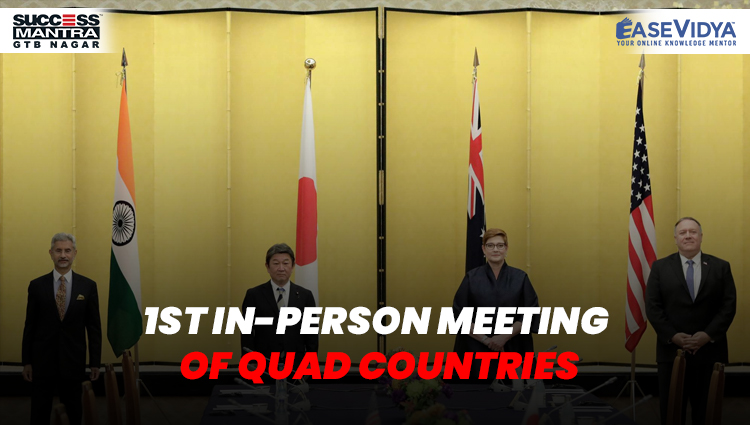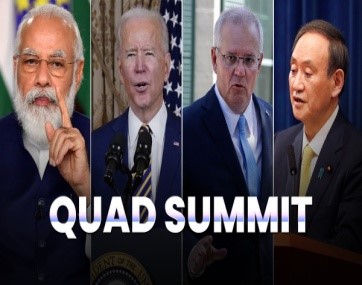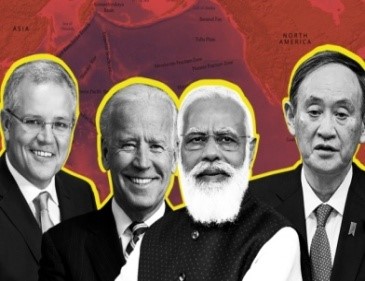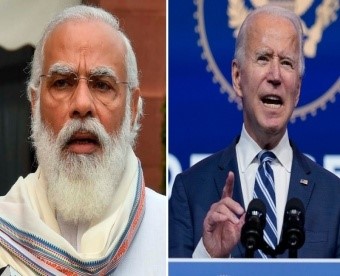
1ST IN-PERSON MEETING OF QUAD COUNTRIES
1ST IN-PERSON MEETING OF QUAD COUNTRIES

Recently, the US announced that the first in-person meeting of the Quad countries is going to be held in New York, US. The heads of all the four countries (India, Japan, Australia, and the US) are going to attend the meeting. Reacting to the upcoming summit, China criticized the Quad and said the formation of "exclusive cliques (circles)" targeting other countries runs counter to the trend of the times and is "doomed to fail".
Current Affairs Notes By Success Mantra Coaching Institute GTB Nagar Delhi CLICK HERE
FORMATION OF THE QUAD
Following the Indian Ocean Tsunami (2004), India, Japan, Australia, and the US created an informal alliance to collaborate on disaster relief efforts. In 2007, then PM of Japan, Shinzo Abe, formalised the alliance, as the Quadrilateral Security Dialogue or the Quad. The Quad was supposed to establish an Asian Arc of Democracy but was hampered by a lack of cohesion amongst its members and accusations that the group was nothing more than an anti-China bloc. In 2017, faced again with the rising threat of China, the four countries revived the Quad, broadening its objectives and creating a mechanism that aimed to slowly establish a rules-based international order. In 2020, the trilateral India-US-Japan Malabar naval exercises expanded to include Australia, marking the first official grouping of the Quad since its resurgence in 2017. Further, it was the first joint military exercises among the four countries in over a decade. In March 2021, the Quad leaders met virtually and later released a joint statement titled ‘The Spirit of the Quad,’ which outlined the group’s approach and objectives.
PARTICIPATION IN MALABAR EXERCISE
It is an annual trilateral naval exercise between the navies of India, Japan, and the USA which is held alternately in the Indian and Pacific Oceans. It began as a bilateral naval exercise between India and the USA in 1992 and was expanded into a trilateral format with the inclusion of Japan in 2015. The Exercise is aimed to support free, open and inclusive Indo-Pacific and remain committed to a rules based international order. It is also aimed at interoperability with an emphasis on humanitarian assistance, surface war manoeuvres, anti-submarines warfare, counter-terror operations, gunnery training and aerial surveillance.
OBJECTIVES OF THE QUAD

According to the ‘Spirit of the Quad’, the group’s primary objectives include maritime security, combating the Covid-19 crisis, especially vis-à-vis vaccine diplomacy, addressing the risks of climate change, creating an ecosystem for investment in the region and boosting technological innovation. However, despite the Quad’s seeming commitment to a broad range of issues, its main focus area is still considered to be countering China. Quad members have also indicated a willingness to expand the partnership through a so-called Quad Plus that would include South Korea, New Zealand, and Vietnam amongst others.
QUAD AND ITS LINKAGES WITH CHINA
Each of the Quad members are threatened by China’s actions in the South China Sea and its attempts to extend its sphere of influence through initiatives such as the One Belt One Road Project. The US has long been concerned about the global competition with China and have maintained that China aims to subvert the international rules-based order. Japan and Australia are likewise both concerned about China’s expanding presence in the South and East China Seas. India has its own long pending border issues with China. On the other hand, China sees the existence of the Quad as part of a larger strategy to encircle China and has pressured countries like Bangladesh to avoid cooperating with the group. The Chinese foreign ministry accused the group of openly inciting discord among regional powers in Asia.
OPPORTUNITIES FOR INDIA UNDER QUAD ARRANGEMENT

Checkmating China: The maritime space is a lot more important to China than engaging in opportunistic land grab attempts in the Himalayas. A huge chunk of Chinese trade happens via the Indian oceanic routes that pass through maritime chokepoints. In the event of any Chinese aggression on borders, India by cooperation with Quad countries can potentially disrupt Chinese trade. Hence, unlike in the continental sphere where India seems facing a ‘nutcracker like situation’ due to China-Pakistan collusion, the maritime sphere is wide open to India to undertake coalition building, rule setting, and other forms of strategic exploration.
Emerging as a Net Security Provider: There is a growing great power interest in the maritime sphere, especially with the arrival of the concept of ‘Indo-Pacific’. For instance, many European countries have recently released their Indo-Pacific strategies. With India, located right at the centre of the Indo-Pacific geopolitical imagination can realise the vision of a ‘broader Asia’ that can extend its influence away from geographical boundaries. Moreover, India can build around collective action in humanitarian assistance and disaster relief, monitoring shipping for search and rescue or anti-piracy operations, infrastructure assistance to climatically vulnerable states, connectivity initiatives and similar activities. Further, India with Quad countries can check imperialist policies of China in the Indian ocean region and ensure Security and growth for all in the region.
ISSUES RELATED TO QUAD
- Undefined Vision: Despite the potential for cooperation, the Quad remains a mechanism without a defined strategic mission. The Quad is not structured like a typical multilateral organisation and lacks a secretariat and any permanent decision-making body. Additionally, unlike NATO, the Quad does not include provisions for collective defence, instead choosing to conduct joint military exercises as a show of unity and diplomatic cohesion.
- Maritime Grouping: The entire focus on the Indo-Pacific makes the Quad a maritime, rather than a land-based grouping, raising questions whether the cooperation extends to the Asia-Pacific and Eurasian regions.
- India’s Aversion of Alliance System: The fact that India is the only member that is averse to a treaty alliance system, has slowed down the progress of building a stronger Quadrilateral engagement.
CONCLUSION
Need For Clear Vision: The Quad nations need to better explain the Indo-Pacific Vision in an overarching framework with the objective of advancing everyone’s economic and security interests. This will reassure the littoral States that the Quad will be a factor for regional benefit, and a far cry from Chinese allegations that it is some sort of a military alliance. The forthcoming Ministerial meetings can be an opportunity to define the idea and chart a future path.
Expanding Quad: India has many other partners in the Indo-Pacific, therefore India should pitch for countries like Indonesia, Singapore to be invited to join in the future. India should develop a comprehensive vision on the Indo-Pacific which would ideate on the current and future maritime challenges, consolidate its military and non-military tools, engage its strategic partners.
PRAVAHINI Current Affairs Notes By Success Mantra Coaching Institute GTB Nagar Delhi CLICK HERE
TEST YOURSELF
Q.1 Recently, which of the following nations have announced that the first in-person meeting of the Quad countries is going to be held where the heads of all the four countries (India, Japan, Australia, and the US) are going to attend the meeting?
- United States of America: ANSWER
- India
- Australia
- None of the above
Q.2 Which of the following would be the main focus of the leaders of Quadrilateral Security Dialogue during the virtual QUAD summit 2021?
- Exploring the opportunities for collaboration in ensuring equitable, safe as well as affordable vaccines in the Indo-Pacific region.
- To support the ongoing efforts to combat terrorism
- To restrain the power of China in the Indo-Pacific Region.
- None of the above
Q.3 Which of the following statements is/are incorrect in the reference to the above mentioned passage?
- Quad has come of age and will remain an important pillar of stability in the indo-pacific region.
- According to Joe Biden the main agenda of Quad Should be limiting the Iran's Dominance in the Middle East: ANSWER
- Prime Minister of Australia highlighted that Indo-Pacific will now shape the destiny of the world in the 21st century.
- None of the above
Q.4 The idea of Quadrilateral Security Dialogue (QUAD) is first initiated by which of the following leaders and then supported by others?
- Japanese PM Shinzo Abe: ANSWER
- US Vice President Dick Cheney
- Australian PM John Howard
- Indian PM Manmohan Singh.
Q.5 Which of the following statements is/are correct regarding the aims and objectives of the Quad Nations?
- Ensuring a “free, open and prosperous” Indo-Pacific region.
- To keep the Indo-Pacific region free from the influence of China.
- To establish trade relations between the four countries.
- All of the above: ANSWER












0 Comment